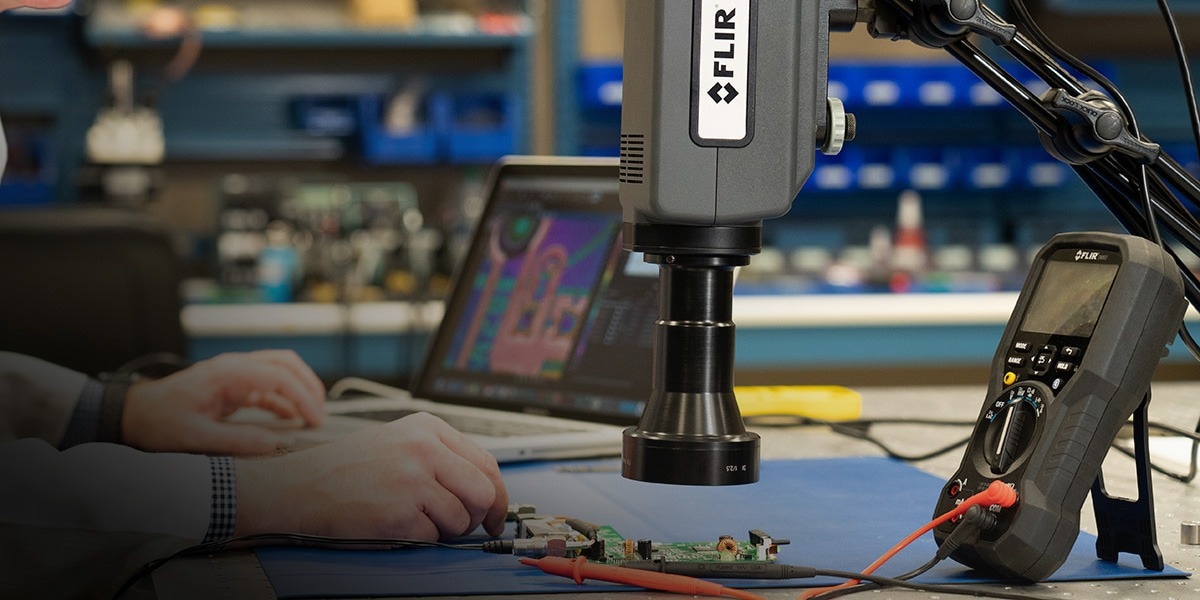With the world currently transitioning to green energy systems and connected infrastructure, demand for new electronic systems and components is growing exponentially.

Image Credit: Teledyne FLIR
This requirement in turn calls for tools that support vital decisions across the entire chain of product development tasks: research and design; quality assurance and verification testing; and troubleshooting and repair. Efficiency is a premium objective in all of these processes in order to control project costs and/or minimise time-to-market. Here, high-performance FLIR A6701 thermal camera packages dedicated to electronic applications can add significant value.
Thermal imaging is critical to efficient electronic design and verification testing, providing precise temperature data to troubleshoot potential problems, optimise thermal efficiencies and even identify counterfeit components. A recent trend in the electronics sector is the demand for ever-smaller, denser and more powerful solutions. However, designs attempting to comply with this request are prone to inherent heat that could cause significant damage. Infrared thermography is therefore gaining popularity during the development phase as it can identify hot spots indicative of failure points or issues with the device.
Central to FLIR’s cost-effective packages for the testing of electronics is the A6700 MWIR mid-wave infrared (MWIR) thermal camera, which operates in the 3.0–5.0 μm waveband (1.0–5.0 μm broadband option) and produces finely-detailed, 327,680 (640 x 512) pixel images. As a further benefit, while gigabit Ethernet and analogue video are active simultaneously, the A6700 offers independent control of each for greater flexibility when recording.
To provide an optimal solution for electronics testing, FLIR can package the A6700 with a macro lens and stand, or with a microscope lens and stand. Both packages carry the A6701 designation.
The FLIR A6701 with MWIR macro lens and stand provides a flexible system for a wide range of electronic assembly and sub-component testing, while delivering the small spatial resolutions required for the accurate measurement of temperatures on individual surface mount components. Although the lens can focus to infinity, at its minimum working distance of 110 mm it can provide a total 21.2 × 16.9 mm overall field of view with a spatial resolution of 33 μm per pixel.
Alternatively, the FLIR A6701 MIWR package featuring microscope lens and stand can help improve electrical efficiency by identifying small thermal anomalies in integrated circuits or measuring the heat output from individual components. The microscope stand stabilises the entire system to enable clear images covering a 9.6 x 7.68 mm target area with a spatial resolution of 15 μm per pixel.
Users of the convenient and cost-effective FLIR A6701 packages can maximise their analysis and data sharing with FLIR’s Research Studio Professional Edition. This advanced thermal analysis software offers a simplified workflow for displaying, recording and evaluating accurate temperature data.
FLIR thermal infrared cameras are fast becoming a standard tool on every electronics test bench. Packages such as the FLIR A6701 - with its combination of camera, lens and stand - deliver a ready-to-go solution for electronics testing, boosted further with the addition of FLIR Research Studio analysis and data-sharing software. It is time to take electronics testing to the next level.